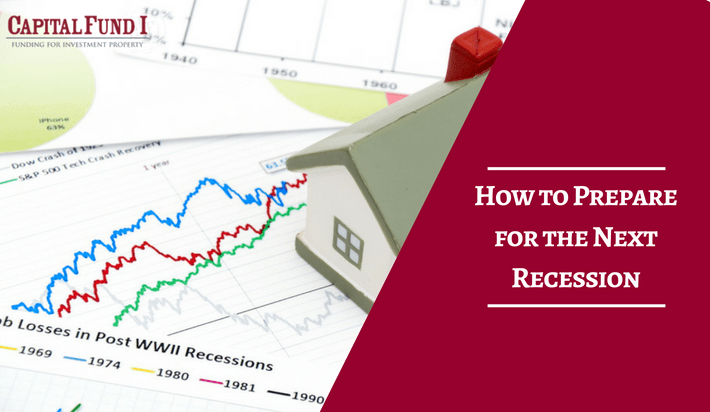Economists agree that we are heading towards a recession. They don’t know exactly when it will hit and what will cause it is still vague, but it is coming and something to expect. This isn’t something new however, our economy tends to work itself into a cycle of expansion, peak, contraction, and trough. We saw this happen with the great depression during the 1930s, then the growth after WWII, the gasoline crisis in the 70s and then boost in the 80s and 90s, to the great recession of the late 2000s.
There is no surefire way to protect yourself from the next recession but having some preparations can help keep you more secure. So, let’s look at these three things you can do to prepare.
From Fix and Flip to Buy and Hold
Fix and flips are a great way to get cash fast, but when the market begins to fall it can also be a great way to lose cash fast. Owning a rental property or several income properties can be a way to help continue making money even when the market is failing because people will still need a place to live. Choosing to purchase a small multi-unit property, or a portfolio of homes can also help benefit you when it does come to your fix and flips as you can cross-collateralize them to increase your private money loan amount.
Investing in multifamily properties, particularly Class-B apartments, can also be a great choice for something that is recession-proof. It is less expensive than Class-A apartments, while also having a higher demand due to more people being able to afford them.
Commercial Real Estate
Just like a residential rental property, you can also receive a monthly income from a strong performing commercial property. Some commercial assets that can make for a safe choice include owning shopping centers with a strong grocer-anchored tenant, self-storage facilities, and mobile home parks, as these are all things that people will still need during a recession. As long as these perform well, a strong monthly income can be made off these and other commercial assets.
These investments will be more expensive at first, but the return on investment will help balance out the costs and you will also have a long-term investment that can continue functioning well even during positive economic health.
Don’t Overleverage
Overleveraging was what got us into the mess that is now known as the Great Recession. Taking on too much debt at one time can be both difficult to manage and a dangerous investment choice in the long run. You can keep yourself from being overleveraged a couple of ways, such as opting for a lower LTV on your private money loan, paying off a little bit of your principal balance at a time, and doing your due diligence to make sure you are paying at a fair value on your investment property purchase.
When working with a hard money loan you may only have interest-only payments, and as tempting as it can be to focus on taking care of just those payments you should also consider paying down your principal balance to help keep yourself from being overleveraged. Paying down your principal balance can help keep your investment safe but can also help lower your monthly interest payments. So, if you have the money to pay some of your principal down, go ahead and do it to put you in a better position.
Predictive Analytics
During the last recession, what were some things that stood out to you as a real estate investor? What was the rent during the trough period in Phoenix as opposed to Mesa? Asking yourself these questions and analyzing them can help you predict future outcomes. Taking the extra step of adding predictive analytics into your investments can help both with determining your ROI on fix and flips, but also on cash flowing properties such as rentals, multifamily, and commercial properties.
How do you plan to stay recession proof? Talk to the Capital Fund 1 team to see how we try to make your investment a safe one.
